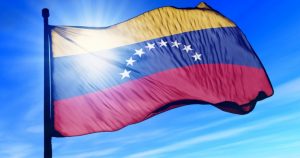
If you know anything about contemporary Venezuela, you’ll know that the nation isn’t known for its financial stability. A couple of generations of unfortunate government decisions have transformed Venezuela from a world leader in oil exports to a strife-ridden state with a worthless currency on the brink of political collapse.
Venezuela’s Wild Relationship With Cryptocurrency
Things have not been going well. The Bolivar (Venezuela’s state-issued fiat currency) has been wildly inflated in recent years. If economic forces continue unabated, inflation could hit 1,000,000% by year’s end. To illustrate this more clearly, at this point in history, a trash bag full of Bolivars won’t buy you a cup of coffee.
This has led Venezuelans into an interesting relationship with cryptocurrencies like Bitcoin. As a decentralized asset that citizens can easily buy, Bitcoin became a hedge against Bolivar devaluation over the past couple of years. Though Bitcoin itself has lost more than half its value in 2018, it is an immovable object compared to the Bolivar.
This story gained traction in 2017, and the Venezuelan government heard the news. Under President Maduro, Venezuela became a trailblazer by releasing a government-issued cryptocurrency: the Petro. However, the Petro isn’t a new Bitcoin. Not by a long shot.
The Petro is “backed” by Venezuelan oil, through by no means that analysts have been able to observe. Government information about the Petro is often contradictory, and though it is claimed that 1 Petro=1 Venezuelan barrel of oil, there is no reason to believe this is “true” in the conventional sense. Weiss Cryptocurrency Ratings declared it “a worthless token”.
The release of the Petro in February 2018 was a mess. Scammers created copycat tokens that flooded the market. The US forbade its citizens from trading in the Petro. As the Petro was meant as a way to circumvent US-led sanctions against Venezuela, the Petro is little more successful than the Bolivar. So what’s to become of the unfortunate Petro?
Venezuela’s Crypto Bank – What is it?
By all appearances, Venezuela is doubling down on its highly questionable cryptocurrency. There are still hopes that the digital token will become an accepted token of international exchange, exposing Venezuela to desperately needed global trade channels. Up till now, most powers (US, India, etc.) have not deigned to trade in the Petro. Venezuela hopes to legitimize the rudderless Petro by giving it a foundation in a new government body.
Beyond this, not much is known. Says Hermann Escarra (minister on the assembly charged with changing Venezuela’s 1999 constitution), “There will be the Central Bank with its functions in exchange, monetary and financial policy and the Central Bank will be incorporated.” Make of this what you will.
Another motivation behind the establishment of a Central crypto bank is related to Venezuela’s replacement of its national fiat currency. This year, Venezuela is set to replace the Bolivar with the Sovereign Bolivar. There are two main differences between the two currencies: 1) the Sovereign Bolivar has the same value as today’s Bolivar, just with 5 zeroes lopped off, and 2) the Sovereign Bolivar will have its value pegged to the Petro!
This last point is truly a wild development. In crypto history, we’ve seen a number of coins with value pegged to a fiat currency (1 Tether = 1 USD being the most famous example). However, to peg a national fiat currency to a turbulent and ill-conceived cryptocurrency; this is something else altogether. It’s hard to say that the Sovereign Bolivar will perform worse than the Bolivar but we find no economic foundation by which this unusual arrangement might be effective.
Does Venezuela Have a Crypto Future?
Nonetheless, Venezuela’s leadership continues on its path. Even as citizens suffer by the million. Even as protestors battle the army in the public square. Even as nationals flee by foot, water, rail, and sky.
There is little reason to believe that, simply by nationalizing a junk cryptocurrency, Venezuela can create money that has value. The Petro has no demonstrable use case. It is cut off from international trade. Its use within the nation (primarily between state-run companies) is as arbitrary as the exchange of the Bolivar. In short, we don’t see this venture ending well.
But this doesn’t mean that Venezuela doesn’t have a future with cryptocurrencies. Even as the crypto markets crash, coins like Bitcoin, Ethereum, NEO, etc. represent liferafts in the whirlpool of Venezuelan currency. Citizens who wish to preserve wealth, own spendable capital, and possibly even prosper economically may find that crypto is the best available option.
For cryptocurrency enthusiasts who have long touted crypto’s power for the poor and the unbanked, this is the prophecy being fulfilled. Venezuela may not be able to foist its bogus token upon the world but the world’s digital assets may be able to offer Venezuela’s citizens a modicum of financial autonomy. Only time, and struggle, will tell.
The post Venezuela Preps Central Crypto Bank. Will Bitcoin Be Affected? appeared first on The independent republic.

Theindependentrepublic.com is author of this content, TheBitcoinNews.com is is not responsible for the content of external sites.
Our Social Networks: Facebook Instagram Pinterest Reddit Telegram Twitter Youtube










